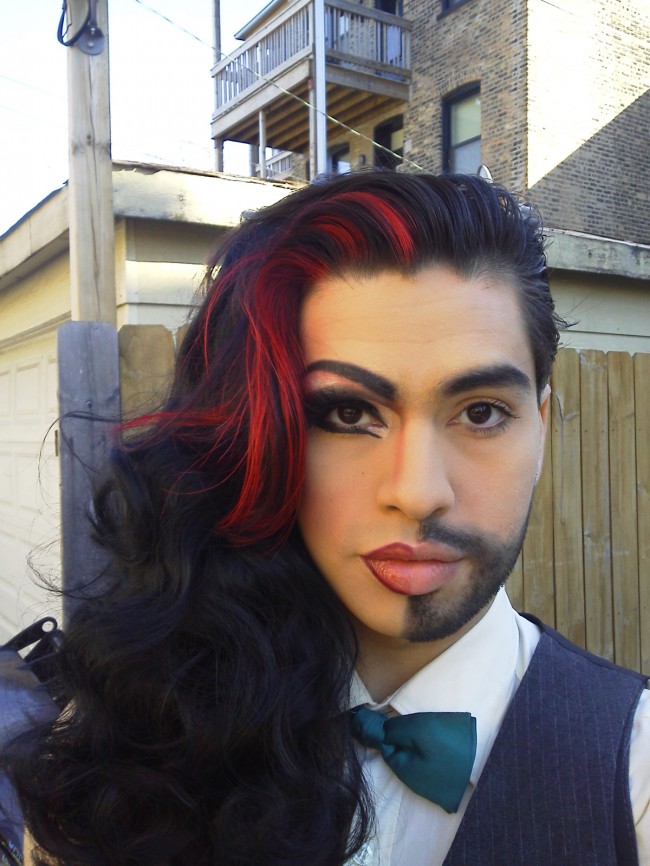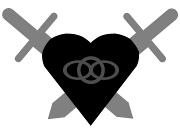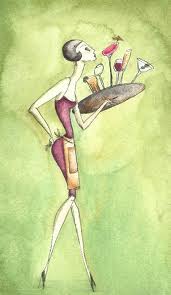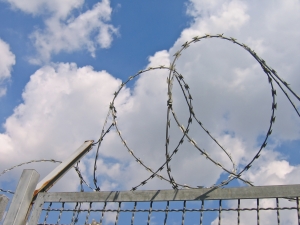Gender’s a beast, I’m telling you. Not so much all on its own, but because of how society treats it. To most people, it’s binary, fixed, and tied to what your genitals look like. I deliberately said “what your genitals look like“ instead of “your sex“. Most people believe sex is determined by the looks of your genitals and – if they even think of it – the configuration of your chromosomes. “Female”, to a biologist, means making large gametes, and “male” making small gametes. That’s it. “Biologists don’t recognize any other universal difference between male and female.” says Joan Roughgarden, a professor of Biological Sciences at Stanford University.
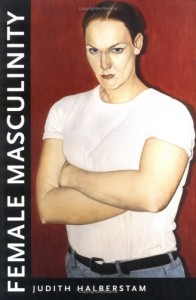 Gender is a much more complex thing, of course. Most people in everyday life, however, want to know what’s in your pants and want to treat you accordingly. If you have a vagina, you must clearly be a woman, and if you have a penis you’re “obviously” a man, despite of how you might present and the words you use for yourself. Intersexed people or those who don’t identify as men or women don’t even exist in most people’s minds. You see, I’m one of those people who don’t identify as a woman or a man. In fact, I currently don’t closely identify with any term at all (an option I’ve come to fully embrace after having read Judith “Jack” Halberstam’s Female Masculinity). Instead of having to worry about what to call myself, I can now focus better on how I feel about my body, stay in the moment to analyze how interactions with other people make me feel, and how my body and social dysphoria interact with each other.
Gender is a much more complex thing, of course. Most people in everyday life, however, want to know what’s in your pants and want to treat you accordingly. If you have a vagina, you must clearly be a woman, and if you have a penis you’re “obviously” a man, despite of how you might present and the words you use for yourself. Intersexed people or those who don’t identify as men or women don’t even exist in most people’s minds. You see, I’m one of those people who don’t identify as a woman or a man. In fact, I currently don’t closely identify with any term at all (an option I’ve come to fully embrace after having read Judith “Jack” Halberstam’s Female Masculinity). Instead of having to worry about what to call myself, I can now focus better on how I feel about my body, stay in the moment to analyze how interactions with other people make me feel, and how my body and social dysphoria interact with each other.
I present in a way that’s considered masculine in today’s culture and use the grammar belonging to the male gender when I speak of myself (German and Slovenian are highly gendered languages, and there’s no way to incorporate another gender without major grammatical upheaval). Yet people, even complete strangers I’ve never seen before and likely never again will, insist on asking me “Are you a boy or a girl?” when they can’t figure it out. I wouldn’t be so upset every time that happens, if they would genuinely want to know my gender to be able to address me properly, but I know that what they really want to know is whether I have a vagina or a dick in my pants. It’s completely beyond me what makes people think it’s an appropriate thing to ask.
Currently, I’m at a point in my life where I struggle with understanding my gender and dealing with the ignorant world around me yet again. It’s the same struggle I went through years ago and that held me back in my educational and personal life. Daily taunts and bullying because of my sexual orientation and gender presentation made life hell when I was at school. I only just dipsy-doodled to graduation, all the while I had to try to cope with the workload from school, the closed-mindedness of my religious family about my orientation, being wrapped up in myself all the time and figuring out the delicate details of myself, and strange reactions to me from the people around me. Every person who’s ever been confused for a cisgendered male in a women’s restroom or has tried to get a haircut considered inappropriate in light of the genitals assumed to be in their pants will know what I’m talking about. It’s a ton of little things that add up to feel like an elephant sitting on your shoulders. It’s stress, stress and some more stress, even if at some point you learn to mostly ignore it and not let it get to you too much. Right now, my gender issues permeate and affect almost every aspect of my life again; professional, personal and creative. (Hello, dear writer’s block, it’s really not nice to see you again.)
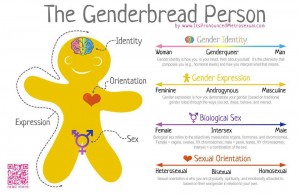
Going on testosterone (“T”) is an option that’s still on the table for me, but one I likely won’t choose soon. I went into one direction with my gender identity and another culturally. The queer women’s community (by which I mean the entire community of lesbian, bisexual and otherwise not-straight women) was a life saver when I was younger, and over the years I had developed a strong affinity for it. Taking T would give me the outward appearance that would make living in this society much easier, and it would allow me to feel more at home in my body, but it would also – at least on the surface, literally even – erase a big part of my history and what makes me the person I am today. I would become invisible as a queer female, invisible to the women I desire as partners. It would be a big step away from the community I cherish so much, and it’s a divorce I’m neither ready for, nor one I want. After all, there’s also a reason why I chose a female pen name, despite striving to go by my chosen men’s name more often in my private life.
For me, whether or not to choose testosterone is a matter of which would be the lesser evil. I feel like I’ve reached an important crossroads. I don’t feel ready to make a decision at all, but there’s no easy way out. Mainstream society not being able to respect people as what they say they are – not that certain problems don’t still exist within the queer communtiy as well – isn’t the only thing that’s responsible for my situation, but it’s a big part of it. If society were able to handle trans* issues like mine better, it wouldn’t make the problems I have with my body go away entirely, but it would certainly make life a lot easier and wouldn’t push me this much in the direction of a divorce I don’t want. Having an official “other” option would already do away with half my problems. Whatever decision I’ll come to, even if that decision might only be temporary itself, I’ll have to make reasonably sure not to make the wrong one. “Wrong” as in either not going far enough because of my fears of the uncertain holding me back, or going too far because I might fall into the trap of feeling I have to prove something to other people.
If you, dear reader, know or happen to meet a trans* person or if you’re ever confused about somebody’s gender:
- Don’t freak out.
- Don’t ask them what’s in their pants or make it sound like you are.
- Don’t loudly hypothesize about their gender in their presence, even if you speak a language you think they don’t understand. (Yes, dear Slovenian customer, it’s you I’m thinking of.)
- Do ask them how they would like to be addressed.
- Do respect whatever they tell you about their gender.
- Do be inclusive and don’t just attach the T to LGB because it looks fancy.
If you do that, you’re helping already. If you want to do more to make our world a place more welcoming and accepting of diversity, take a look at the links below to learn more about how you can be a trans* ally and, if you’re cisgendered, brush up on your knowledge of cisgender privileges – one of them being that you’re most likely not even aware of having them.
Oh, and please try not to scream at us trans* folk in public restrooms. I promise we don’t do anything more outrageous in there than anyone else.
Sources:
Tips on how you can be a good trans* ally:
http://nnhs-gsa.org/transwhat/allyship/
http://lgbtcenter.ucdavis.edu/lgbt-education/trans-ally-tips
Cis Privilege Checklist from Taking Up Too Much Space:
http://takesupspace.wordpress.com/cis-privilege-checklist/
The quote of Joan Roughgarden was taken from her book Evolution’s Rainbow – Diversity, Gender, and Sexuality in Nature and People, published by University of California Press. Recommended reading!
____________________________________________________________________________________________________
Follow and ‘like’ the author’s Facebook page here —-> Faith McLay Official
Gendertrouble - A Personal Account,
